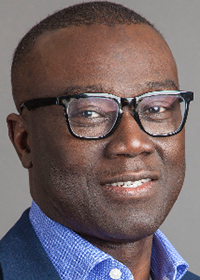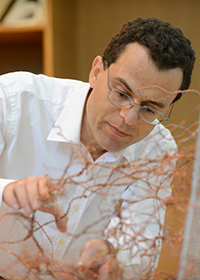"Don’t think of graduation as crossing the finish line but as launching into space. It is the glorious, powerful, earth-shattering blast-off for a wonderful adventure.”
— Peter Farrell, Department of Information Sciences and Technology.

Peter Farrell, coordinator of the capstone design projects for the Department of Information Sciences and Technology, says graduates may have opportunities to pursue different career paths, and those paths may not be the ones they expected.
During their careers, Mason Engineering graduates will have to adapt to changing circumstances, learn new skills and technologies, and know when to ask for help, the school’s faculty members say.
Students who switched to remote learning at the end of the spring semester did all these things and more, says Elizabeth White, a professor in the Department of Computer Science.
“For those students who made it through despite bad internet connections, long hours of sitting in front of a computer with a headset on, and, of course, lots of assignments, please be proud of what you have accomplished,” she says.
White and other Mason Engineering professors offered words of encouragement and wisdom to 2020 graduates as they prepare to open the next chapter of their lives. Among their insights:
Get ready for a big adventure
Don’t think of graduation as crossing the finish line but as launching into space, says Peter Farrell, an instructor and coordinator of capstone design projects for the Department of Information Sciences and Technology. “It is the glorious, powerful, earth-shattering blast-off for a wonderful adventure.”
There will be lots of opportunities to pursue different career paths, and those paths may not be the ones you expected, he says. “I got into IT by learning to be a good negotiator,” says Farrell, BS Business ’79, MBA ’85. “I was a vice president running large national and international IT projects and ended up as a senior vice president of IT consulting. Now I’m at Mason’s Volgenau School sharing what I learned running big IT projects.”

Elisabeth Lattanzi, a mechanical engineering instructor, says to have compassion for yourself when things don't go as you expected.
Be patient with yourself
“Don’t expect to land the most amazing job ever as your first job, and don't expect to be amazing at your first job,” says Elisabeth Lattanzi, an instructor for the Department of Mechanical Engineering. “You will make mistakes; the trick is not to repeat them.”
You might have to do something you don't love while planning for your future career, and that’s okay, she says. “Graduates are going to be deployed into a really strange world that is infinitely more unpredictable than the world of three months ago, so having compassion for yourself when things aren't going the way you want is a valuable life skill.”
Ask for help
“There is no shame in saying, ‘I don’t know’ and asking for help. It's brave,” says Yotam Gingold, an associate professor of computer science. “When you're brave and enthusiastic, people will want to help you.”

Elizabeth Johnson, an assistant professor in the Department of Statistics, says graduates must be adaptable to ever-changing circumstances.
Work hard but take time for rest
Your career is a marathon, not a sprint, says John Shortle, chair of the Department of Systems Engineering and Operations Research. “Think about what matters most to you. Many things will compete for your time. What will be most important to you in five years, 10 years, 50 years? Make sure to set aside time for those things.”
Keep learning
Elizabeth Johnson, an assistant professor of statistics, points out that Winston Churchill once said, “This is the end of the beginning,” which sums up this time of life. “Graduates must be adaptable to ever-changing circumstances and realize that they will continue to learn all through their careers,” she says.
Roll with the punches
If your goals don’t work out as planned, keep your spirits up, says Cameron Nowzari, an assistant professor in the Department of Electrical and Computer Engineering.
“If COVID-19 has taught us anything, it's that rolling with the punches and being able to adapt can be equally important as having a clear plan you can stick to. Sometimes even well-thought-out plans may not manifest, and it can be entirely out of our control. In these times, it's important to be able to adapt and continue forward towards an even brighter future than originally planned.”

Ebrima Ceesay, IST associate professor, says to be humble, kind, and equitable throughout your career.
Make long-term career plans
Successful graduates plan past their entry-level jobs, says Laura Kosoglu, associate professor and associate chair of the Sid and Reva Dewberry Department of Civil, Environmental, and Infrastructure Engineering. “They look at the position they want years from now, and they learn what career path and experience people in that position typically have.”
If there is a typical set of skills, certifications, or professional network that is common for people in that position, seek those out now, she says.
Remain humble
Try to recognize the humanity in everyone you come in contact with. If you can’t make a positive impact in people's lives, leave them alone and move on, says IST Associate Professor Ebrima Ceesay, a principal scientist and lead for the Cyber Center of Excellence at Noblis.
“Be kind, be nice, be equitable, and see every moment as a teachable moment. Keep learning and continue to apply yourself.”

Giorgio Ascoli, a bioengineering professor, suggests staying in touch with friends, classmates, and professors from Mason.
Stay in touch
In the past few years, students have grown through their relationships, as well as through classes and projects, says Giorgio Ascoli, a professor in the Department of Bioengineering. “Your life is richer because of the contacts you created,” he says.
In the years and decades to come, make a sincere effort to stay in touch with your friends, classmates, and professors from your college years:
- Email them regularly with updates regarding your career, family, and whereabouts.
- Start or participate in social groups, attend reunions, and make time for one-on-one phone calls a few times a year.
- When opportunities arise due to business or leisure travel, visit each other and catch up over a meal or a walk.
Don’t let those relationships fade away, Ascoli says. “Cultivate them. If you actively maintain this network, you are going to be pleasantly surprised by how personally uplifting and practically useful it will continue to be throughout your life.”
“Your life is richer because of the contacts you created. In the years and decades to come, make a sincere effort to stay in touch with your friends, classmates, and professors from your college years.”
— Giorgio Ascoli, Department of Bioengineering
